In September this year, Billy Bragg received the Spirit Of Americana/Free Speech In Music Award at the Americana Music Awards in Nashville, Tennessee.
It’s undoubtedly a big honour for anyone, and particularly so for a British musician. But Bragg’s suitability for the award couldn’t be denied. He’s perhaps best known for his contemporary protest songs, while his admiration of American folk icons Woody Guthrie and Bob Dylan has never been a secret. Additionally, his 2013 LP Tooth & Nail was conspicuously indebted to Americana and country music.
However, Bragg’s Englishness has long been a significant aspect of his artistic identity. So, Americana award aside, it would’ve be hard to foresee his latest release, Shine A Light: Field Recordings From The Great American Railroad – a collectionof 13 American folk and blues standards recorded alongside American songwriter and producer Joe Henry.
As the title implies, the album is made up of what Bragg refers to as “railroad songs”, including those written or popularised by Lead Belly, The Carter Family, Glen Campbell, Johnny Cash and Ramblin’ Jack Elliott. It’s a covers album, which makes it even more unexpected considering Bragg’s long-standing affiliation with political activism and his punk rock approach to folk music. But he assures us that Shine A Light isn’t a harbinger of fading intent.
“I think it’s very important when you’re doing a covers record that you bring another perspective,” Bragg says. “What’s the point of making art if you’re not going to offer a new perspective on something? That’s what’s always driven my songwriting. Whether it’s a love song or a political song, it doesn’t really matter; I’m trying to impart something that I can see that I don’t think anybody else has picked up on.
“The most you can do with any art is send someone away with a different perspective. You can’t change things, but you can change people’s perspective.”
The record is a stripped-back affair, featuring just two voices and two acoustic guitars. Correspondingly, Bragg and Henry haven’t vastly restructured any of the selected railroad songs, but their overarching ambitions are quite pointed.
“A lot of the songs we recorded are songs that people are vaguely familiar with – ‘Midnight Special’ and ‘Waiting For A Train’ – but it’s a long time since anyone’s brought them back into the light and said, ‘Look, there’s another way of looking at this,’” says Bragg. “These aren’t some dusty things on a shelf. This railroad is still here, still functions. We’re trying to say to people, ‘This is really still there. You can still do this.’ Because the Americans don’t really think so much about riding on the trains.”
Midway through the 20th century, cars supplanted trains as the primary means of transportation in America. Owning a car is viewed as a symbol of freedom, but in Bragg’s reckoning, the advent of the car was far less significant than the introduction of the train.
“The railroad obviously played a huge part in connecting their country,” he says. “It connected the disparate parts of the United States of America in a way that was perhaps more transformational than any other technology that has come since – much more than the internet. The internet connects us, telephones connect us, but the physical connections of the railroad – coming after millennia where people could only travel as fast as a horse could gallop or a ship could sail – that transformation [was far greater].”
Along with successfully recontextualising the source material, there’s a great narrative behind the making of Shine A Light. Bragg and Henry recorded it during a three-day cross-country rail journey from Chicago to Los Angeles, cutting tracks on the train platform, in station halls and inside train carriages. It’s an admirable creative approach – the musician’s equivalent of method acting – but more importantly it’s resulted in a compelling 13-track album that plays like a united body of work.
“People only listen to tracks now, and we wanted to take people on a journey with the album,” Bragg says. “The vinyl is a gatefold sleeve and it has a map in the middle of it. We wanted people to get on with us in Chicago and stay with us all the way until the end – to listen to the album in its entirety, not just listen to a track here and a track there.”
Not only does the record have an impressive sonic quality, highlighting the complementary dynamic between the two folkies’ voices, but the ambience provided by the recording locations enhances the impact.
“What you’re hearing on the record is the environment that we’re in,” says Bragg. “If you listen closely on headphones, never mind the extraneous noises, I think you can actually hear the space that we’re in. When we’re on the train recording ‘Lonesome Whistle’, you can hear the padded sleeper car. You can hear when we’re in El Paso that we’re in a cathedral of a railroad station. You can hear Alpine is a large room, the waiting room there.
“We had a mic each and we faced each other as we sang, but then we had another two mics at right angles to us that were picking up the environmental sounds and that was really, really important.”
Shine A Light: Field Recordings From The Great American Railroad is out now through Cooking Vinyl. Billy Bragg and Joe Henry perform at theConcert Hall, Sydney Opera House on Wednesday April 19; and Bluesfest 2017, Tyagarah Tea Tree Farm, Thursday April 13 – Monday April 17.

































